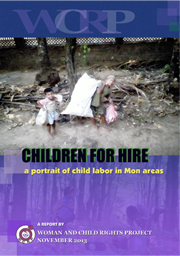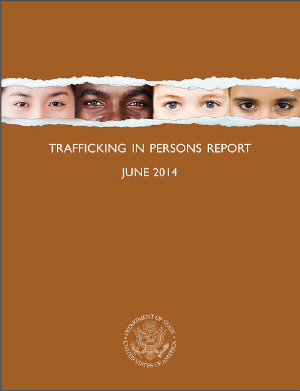Posts Tagged ‘Children’ (29 found)
Trafficking in Persons Report 2014
Burma is a source country for men, women, and children subjected to forced labor, and for women and children subjected to sex trafficking in other countries. Burmese men, women, and children who migrate for work abroad, particularly to Thailand and China, are subjected to conditions of forced labor or sex trafficking in these countries. Poor economic conditions within Burma continue to drive large numbers of Burmese men, women, and children to migrate through both legal and illegal channels for work primarily in East Asia, as well as destinations including the Middle East, South Asia, and the United States. Men are most often subjected to forced labor, often in the fishing, manufacturing, and construction industries abroad. Women and girls are primarily subjected to sex trafficking or domestic servitude. The large numbers of migrants seeking work in Thailand’s fishing and domestic work sectors do so outside formal channels. Some Burmese men in the Thai fishing industry are subjected to debt bondage, passport confiscation, or false employment offers; some are also subjected to physical abuse and are forced to remain aboard vessels in international waters for years […]
• • •Children of Kachin Need Protection and Have a Right to Peace, Says UNICEF
Recent fighting between the Myanmar National Army and the Kachin Independence Army in the vicinity of Man Win Gyi and Momauk areas (Southern Kachin State) has forced thousands of people, including an estimated 1,000 children, to leave their temporary homes. For many of them […]
• • •Children for Hire: A Portrait of Child Labor in Mon Areas
 The growing domestic and international attention being paid to child labor in Burma, also known as Myanmar, signals a vital step in the country’s reform and development process. The advent of new funding to research the scope of the problem, proposed amendments to labor laws, and popularized documentaries exposing the lives of working children have indicated fresh interest in revealing and reducing the incidence of child labor.
The growing domestic and international attention being paid to child labor in Burma, also known as Myanmar, signals a vital step in the country’s reform and development process. The advent of new funding to research the scope of the problem, proposed amendments to labor laws, and popularized documentaries exposing the lives of working children have indicated fresh interest in revealing and reducing the incidence of child labor.
However, the catalyst for this report was sparked by observations that these proliferating activities and discussions are often largely restricted to urban areas, particularly regarding the well-known prevalence of Burma’s “teashop boys.” While urban forms of child labor warrant immediate and effective interventions, the ambiguity that shrouds less visible forms of the practice, especially occurring in rural ethnic villages and communities tucked against the country’s vast borderline, necessitates targeted illumination. During several interviews conducted for this report, civil society members and child protection officers described child labor in Burma as vastly under-researched, and said that accurate data from the country’s peripheral areas is almost nonexistent […]
WCRP Releases “Children for Hire” to Mark Universal Children’s Day
The Woman and Child Rights Project (WCRP) has released its report, “Children for Hire: A portrait of child labor in Mon areas,” to illustrate the incidence of child labor in rural Mon communities and along Burma’s eastern border. Drawn from 67 interviews conducted with working children and their families, health workers, public sector and civil society members, and child protection officers, the report aims to elevate the voices of underage workers and expose the less visible forms of child labor that exist outside of urban settings […]
• • •Rights Groups Call on ASEAN to Implement New Declaration on Eliminating Violence Against Women and Children in Accordance with International Standards
Amnesty International and the International Commission of Jurists called on members of the Association of Southeast Asian Nations (ASEAN) to increase efforts to protect the rights of women and children in light of the newly adopted Declaration on the Elimination of Violence against Women and Elimination […]
• • •Myanmar: Act Now to Prevent Recruitment of Child Soldiers, Following New SC Recommendations
The Myanmar government must act now to implement the recent recommendations issued by the UN Security Council Working Group on children and armed conflict (UNSCWG) to end the recruitment and use of children as soldiers, Child Soldiers International said today. On 16 August 2013, the UNSCWG released its conclusions on children and armed conflict in Myanmar, urging the Myanmar government to take specific measures to protect children from unlawful recruitment by the Myanmar military and armed groups, and thereby live up to its commitments to bring a definitive end to underage recruitment in the country […]
• • •Burma/Myanmar: KNU/KNLA Commits to the Protection of Children and the Prohibition of Conflict-Related Sexual and Gender-Based Violence
After seven years of dialogue with Geneva Call on international humanitarian norms, a ground-breaking step has been taken by the Karen National Union/Karen National Liberation Army (KNU/KNLA). KNU/KNLA has signed Geneva Call’s Deed of Commitment for the Prohibition of Sexual violence in Situations of Armed Conflict and towards the Elimination of Gender Discrimination and the Deed of Commitment for the Protection of Children from the Effects of Armed Conflict […]
• • •Statement on the Occasion of Signing the Geneva Call Deed of Commitment Protecting Children in Armed Conflict and the Deed of Commitment Prohibiting Sexual Violence in Armed Conflict and Gender Discrimination
We, the Karen National Union (KNU), are proud to sign the Deed of Commitment for the Protection of Children from the Effects of Armed Conflict and the Deed of Commitment for the Prohibition of Sexual Violence in Situations of Armed Conflict and Towards the Elimination of Gender Discrimination […]
• • •BURMA: Act on Courts, Police Covering up Child Rape
The Asian Human Rights Commission on Wednesday condemned ongoing efforts by the courts and police in Burma to thwart prosecution of an influential person accused of abduction and rape of a child […]
• • •UNICEF Welcomes the Release of 24 Children from the Tatmadaw, Calls for Acceleration of Discharges
The Tatmadaw officially discharged 24 children in a ceremony in Yangon on 15 February, Friday, attended by senior officials of the Tatmadaw, the Representative of UNICEF as co-chair of a UN Country Task Force on children and armed conflict, senior officials […]
• • •









 All posts
All posts